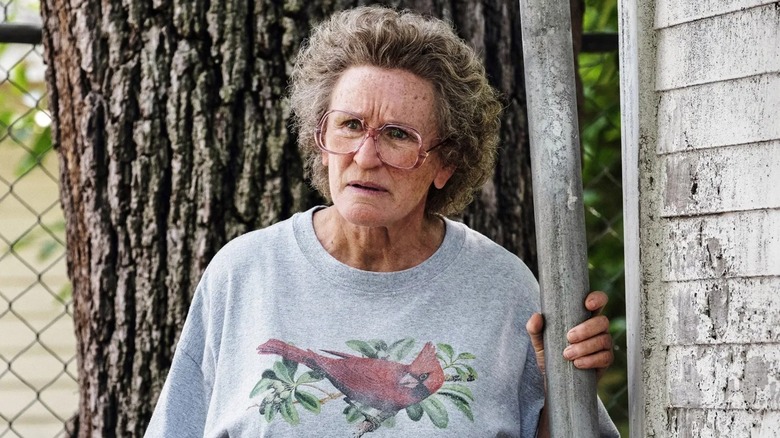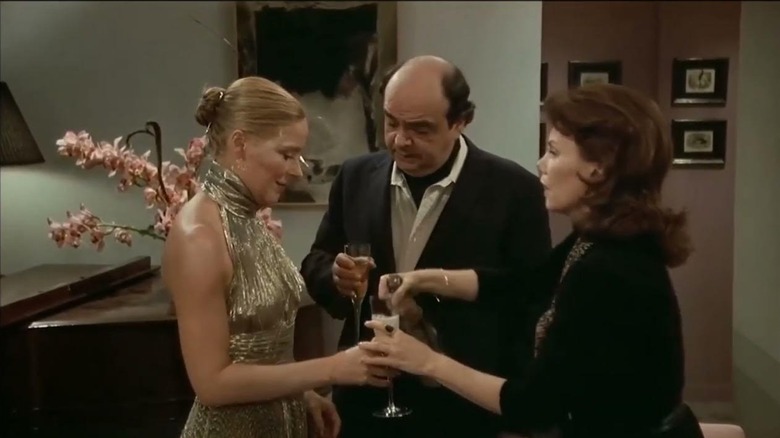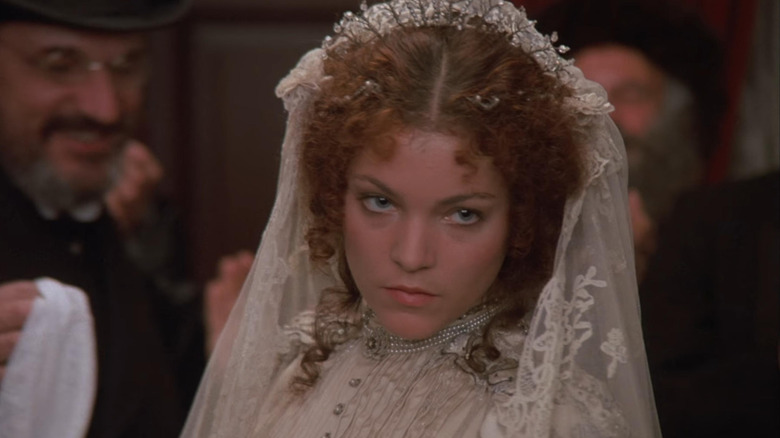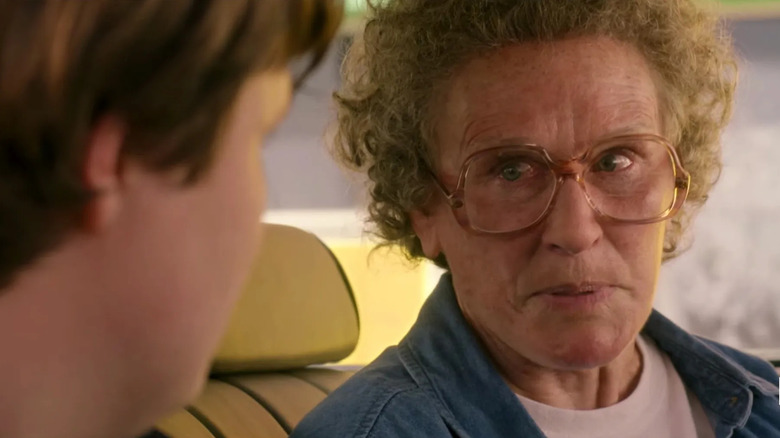Actors Who Received Oscar And Razzie Nominations For The Same Role
Ask any actor at basically any level of fame and notoriety and they'll probably tell you that they dream of winning an Academy Award for one of their performances. The award, also called the Oscar, has been around since 1929 and is given, each year, to the best cinematic achievements and performances. (Well, that's the idea, but sometimes, performances and movies win Oscars that perhaps should have gone to other nominees, which is its own thing entirely.) Whether you're just nominated or you take home the gold during the ceremony, "Oscar nominee" and "Oscar winner" get permanently tacked onto your name forever. It is, I can only imagine, incredibly special!
Now imagine that you're an actor and you get a call from your team telling you that you've been nominated for an Academy Award, you've also been nominated for a Golden Raspberry Award. On the complete other side of the spectrum, a Golden Raspberry, usually just referred to as a Razzie, cheekily honors the absolute worst movies and performances every year; after the first "ceremony" was held in 1981 in the living room of founder John J. B. Wilson, they've become a strange sort of industry staple, offering up dubious "awards" for actors and directors. (They don't give Razzies for production aspects, which is good, actually.)
As of this writing, only one actor has won an Oscar and a Razzie in the very same year — Sandra Bullock for "The Blind Side" and "All About Steve" — but a handful of others have received nominations for both "awards" for the exact same role, which is potentially even more impressive (in a weird way). So who are they, and what are the roles?
James Coco, Only When I Laugh
Directed by Glenn Jordan and penned by acclaimed screenwriter and playwright Neil Simon, "Only When I Laugh" — which is actually adapted from Simon's play "The Gingerbread Lady" — centers around struggling actress Georgia Hines (Marsha Mason), who returns to New York after a prolonged stay at a facility to try and overcome her alcohol addiction. Upon her arrival, she reunites with her two best friends: socialite Toby Landau (Joan Hackett, who earned a best supporting actress nomination at the Oscars) and similarly struggling actor Jimmy Perrino (James Coco). Coco is, of course, the person in this project with the distinction of earning an Oscar and a Razzie nod for the same role.
As Georgia tries to adapt to her sobriety — amidst some drama with her ex David Lowe (David Dukes) and as she tries to be a good mother to her daughter Polly (Kristy McNichol) — we also watch Coco's Jimmy go through a pretty rough journey, finally booking a big role in a play before getting fired only a few days before the first performance. (Also, weirdly, Kevin Bacon plays a bit part in this movie!) Both the Razzies and the Oscars took notice of Coco's role as Jimmy, and the rest is history. Coco lost the Oscar to legendary British actor John Gielgud, who took home the award for his role as Hobson in Steve Gordon's romantic comedy "Arthur" — and the Razzie for which he was nominated went to Steve Forrest, who played Greg Savitt in the infamously campy drama "Mommie Dearest."
Amy Irving, Yentl
Barbra Streisand may have won a Golden Globe for her directorial feature debut "Yentl" in 1981 — a film which also features her as its titular character, a young Ashkenazi Jewish woman living in a Polish shtetl who steadfastly refuses to get married — but her co-star Amy Irving got all of the attention from awards ceremonies in both good and bad ways. After Yentl's father — who was secretly helping her study the Talmud even though women are forbidden from doing such things — passes away, she cuts her hair and poses as a boy named Anshel, the name of her brother who also passed. This is where things get tricky, though ... because Yentl is so good at pretending to be a young man that, when she enrolls in a Jewish school known as Yeshiva, a fellow student's fiancée, Hadass Vishtower (Irving), starts falling in love with her. Not only that, but after Hadass' engagement to that student, Avigdor (Mandy Patinkin), is called off, Hadass and "Anshel" end up married, though they obvious can't consummate the union in the way that Hadass probably expected.
As Hadass falls for Yentl as Anshel, Yentl is herself falling in love with Avigdor, and after he's sent away from the Yeshiva, the two end up finding each other despite both of their previous commitments to Hadass. So what competition did Irving face for her role as Hadass at both ceremonies? Irving lost her Razzie to Sybil Danning, who, somewhat astoundingly, won it for two projects — the exploitation film "Chained Heat" and Lou Ferrigno's take on "Hercules" — and lost her Academy Award to Linda Hunt for her role as Billy Kwan in Peter Weir's film "The Year of Living Dangerously."
Glenn Close, Hillbilly Elegy
In 2016, James Donald Bowman, who was then going by JD Vance, wrote a memoir called "Hillbilly Elegy," and in 2020, Ron Howard's adaptation of the book hit Netflix. Despite blowback over the book and debates about whether or not Vance was fair or even accurate about his suburban Ohio origins — because the book paints a rather dire picture of his upbringing — the movie brought in an all-star cast, including Amy Adams as Vance's mother Beverly, Freida Pinto as his eventual wife Usha, Haley Bennett as his older sister Lindsay, and Glenn Close as his well-meaning but rough grandmother Mamaw.
Clad in an unbelievably bad wig and stuck in frumpy clothes and oversized glasses, Close — a typically wonderful performer who was a favorite to win an Oscar just two years prior in 2018 for "The Wife" only to lose in a surprise upset to Olivia Colman for, ironically, "The Favourite" — is terrible in "Hillbilly Elegy," and the movie isn't particularly good either. (Both Adams and Close really give it their all, and that's both a compliment and an insult.) Honestly, the most surprising thing about her double nomination in 2020 is that she even made it into the Oscar race in the first place. Ultimately, South Korean actress Yuh-jung Youn beat out Close for the Oscar for her deeply felt and emotional performance as grandmother Soon-ja in Lee Isaac Chung's autobiographical film "Minari." As for the Razzie, Close lost that awkward honor to actress and dancer Maddie Ziegler for her baffling performance in Sia's equally baffling movie "Music."



